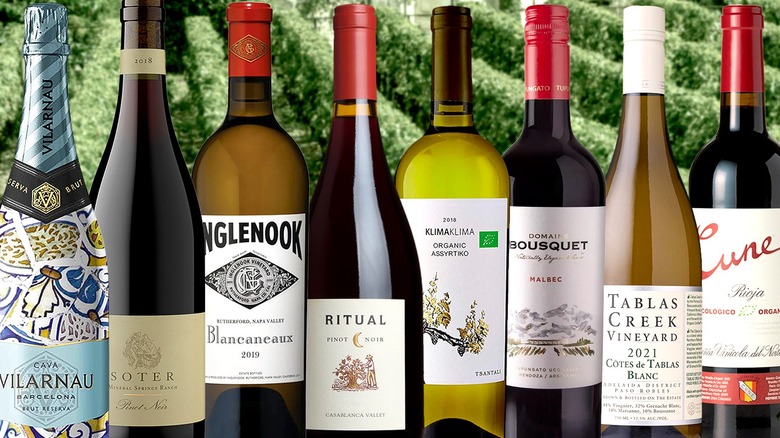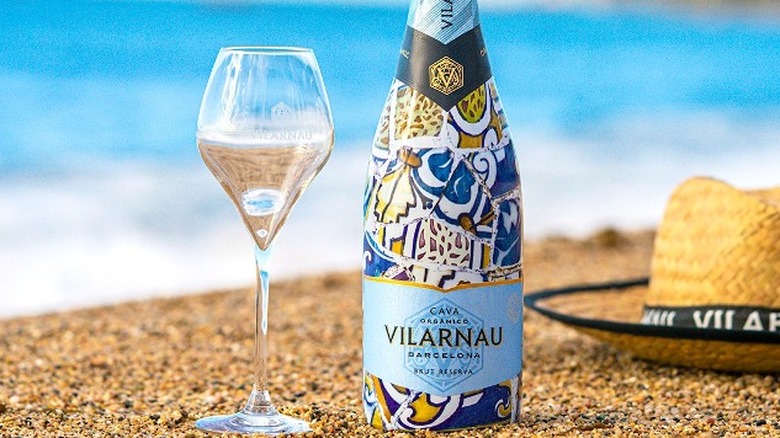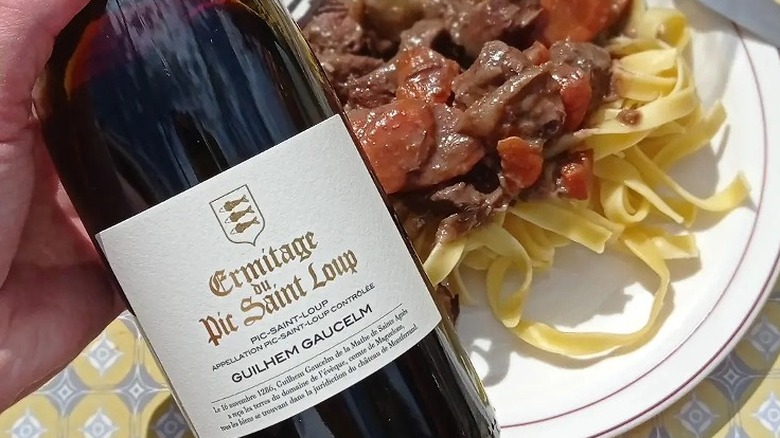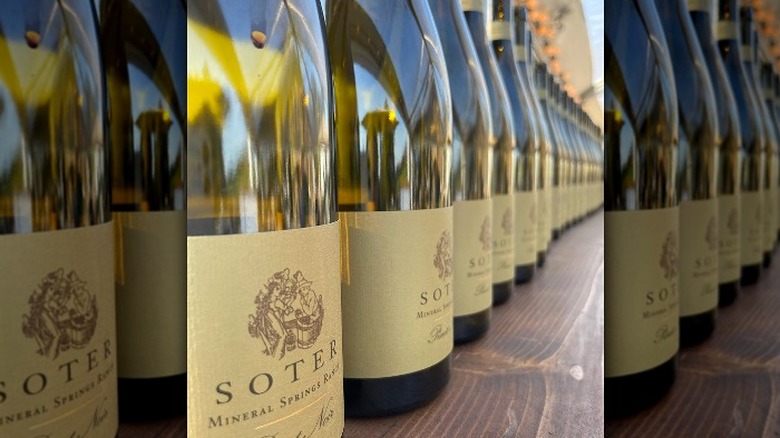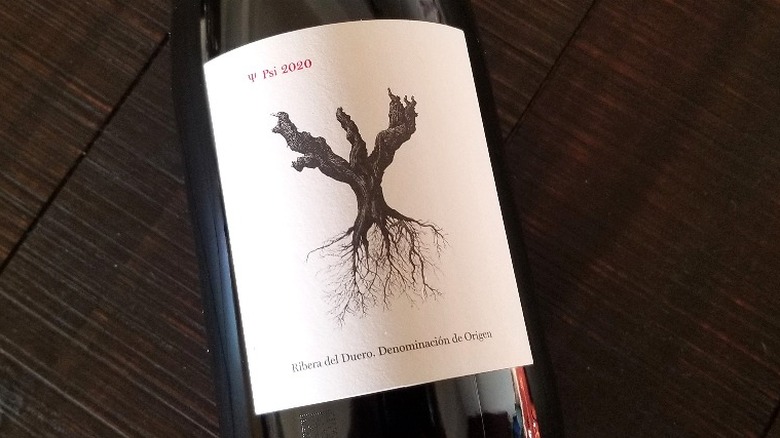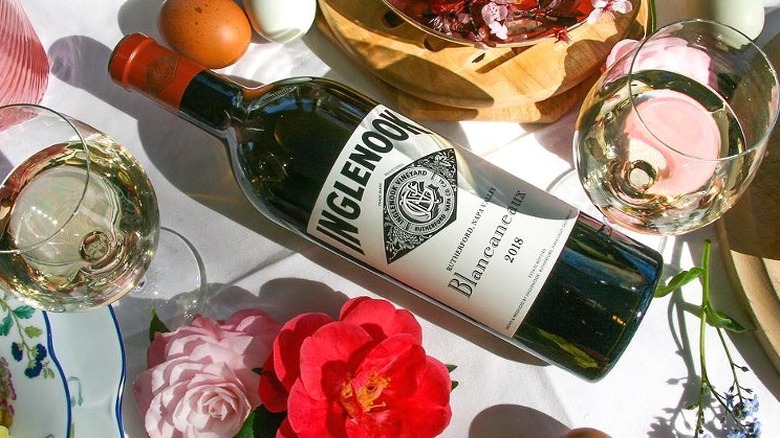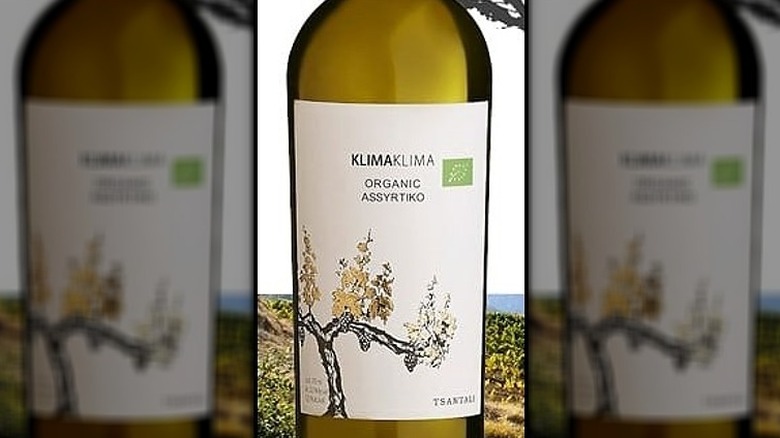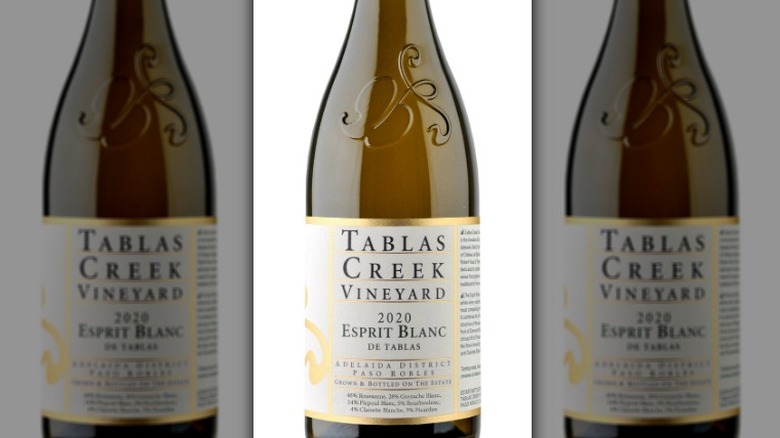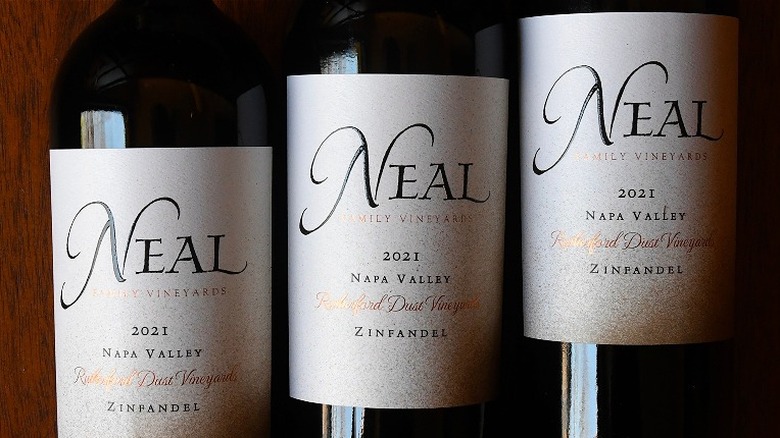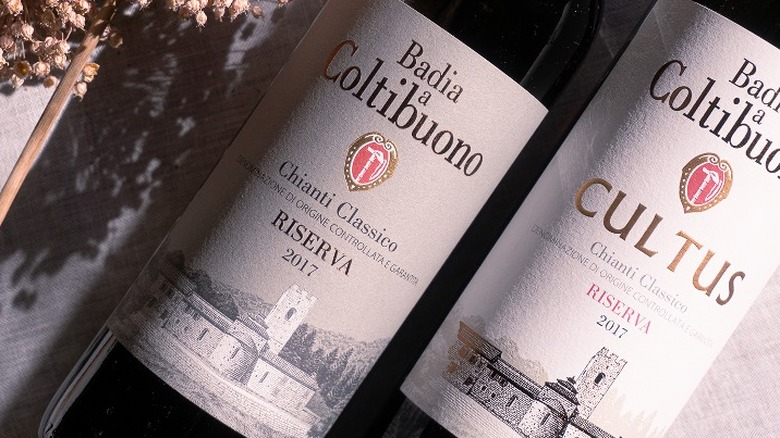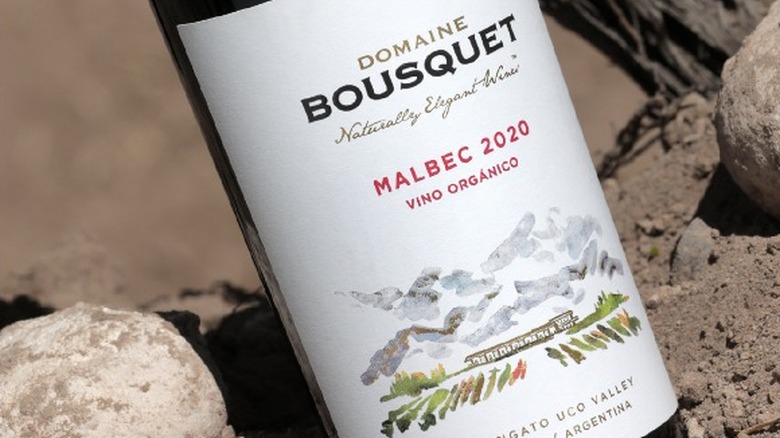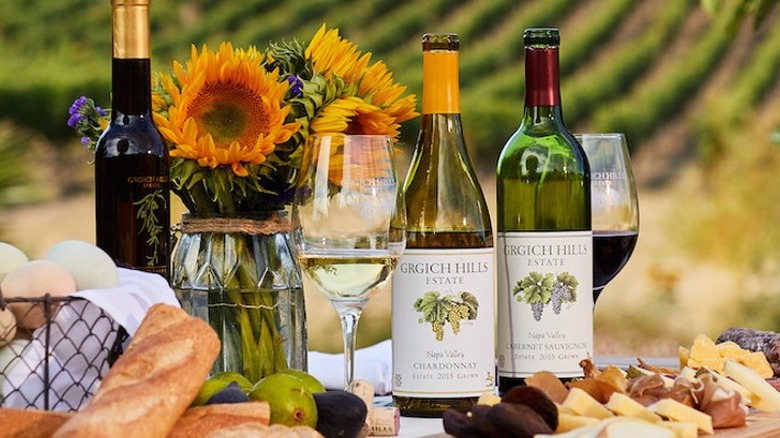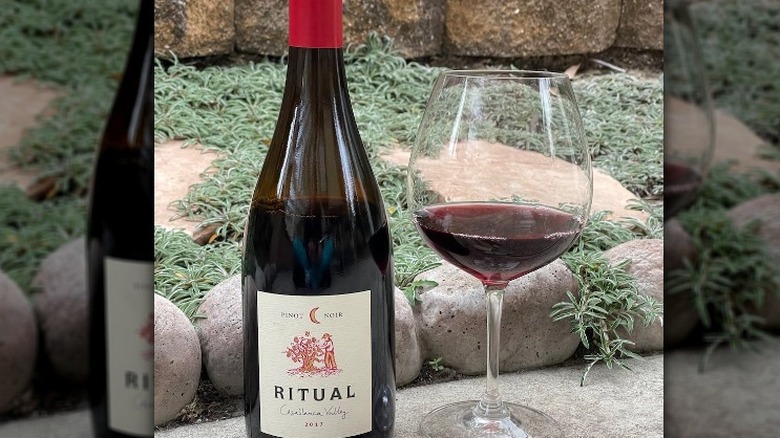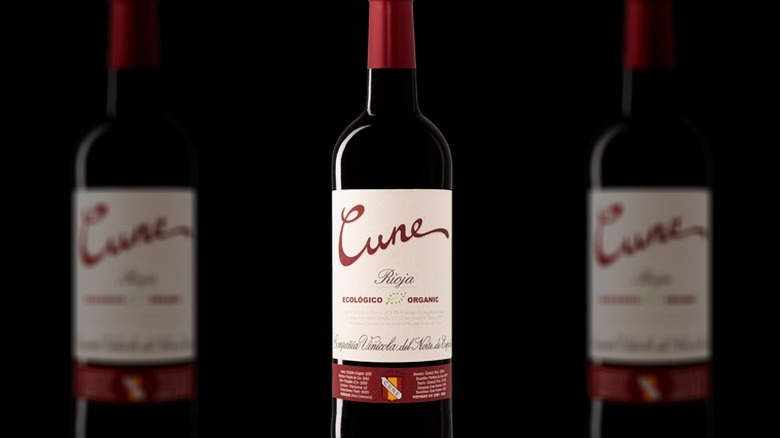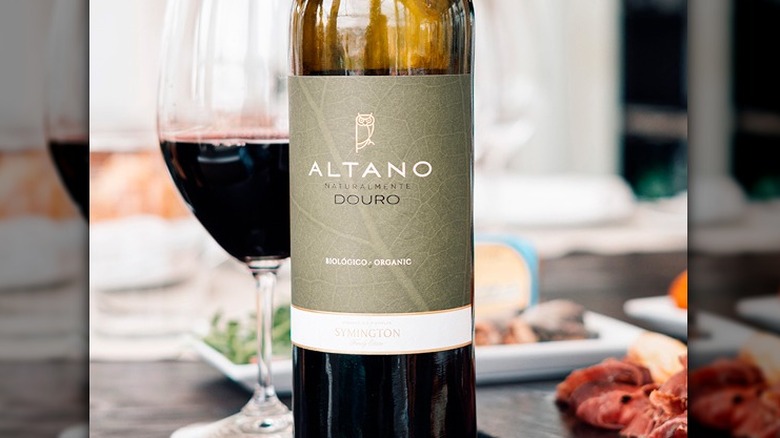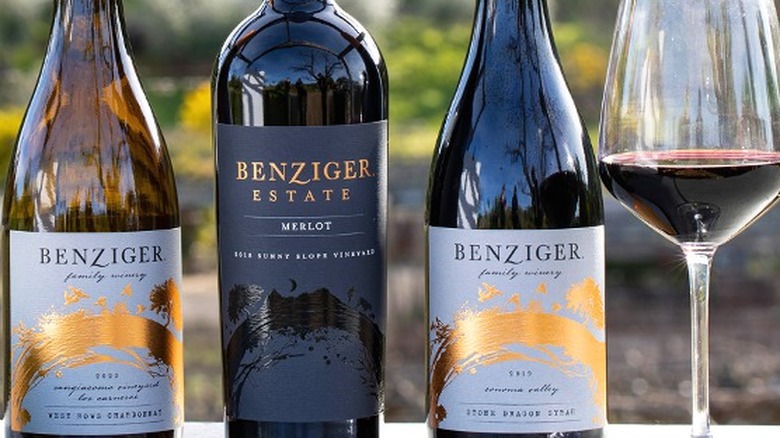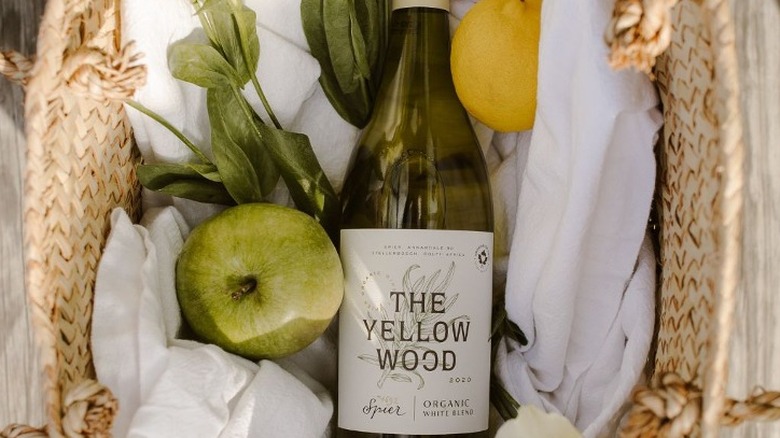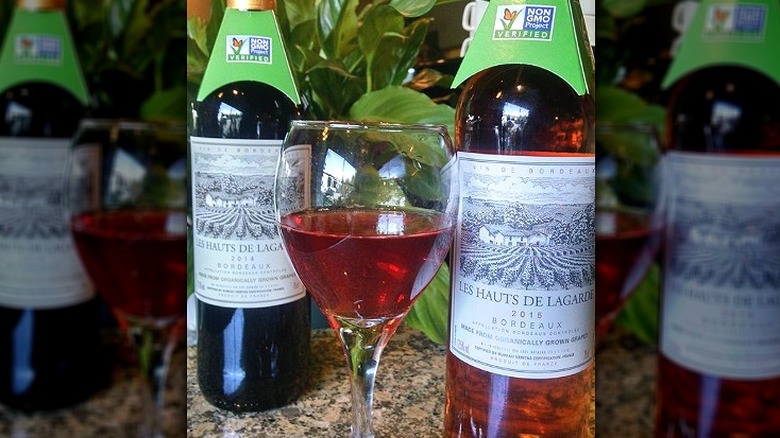17 Best Organic Wines For Earth Day
Society's focus on organic farming came about after the rise of conventional agriculture in the mid-part of the last century. Using synthetic chemicals and materials in commercial farming post World War I and II ensured high food production volumes, feeding millions in war-torn communities. However, the quality was lacking, with harmful fertilizers and chemicals beginning a downward environmental spiral that is ever more present today. A 2019 study by the World Resources Institute found that conventional farming contributes up to one-quarter of global greenhouse gas emissions.
Today's food movements hope to change that as consumers turn towards healthy organic crops. Artificial chemicals, pesticides, or fungicides to fight pests or diseases are forbidden in organic food production, including wine, making it better for the environment and those who farm the land.
Though the organic wine category is small, it is growing as today's winemakers meet consumer demand for high-quality selections that fit their lifestyle and eco-friendly values. According to Grand View Research, the organic wine market in the United States was valued at almost $9 billion in 2021. Transparency Market Research projects that the organic wine market will reach $30 billion worldwide by 2030.
Besides avoiding environmental and health concerns, organic wines authentically reflect the terroir where grapes are grown. The wines showcase the land, unaltered by inorganic additives that mask the natural flavors. With that in mind, we planned ahead this Earth Day by taste-testing some of the best organic wines and speaking with several producers adhering to organic practices.
Vilarnau Brut Reserva Orgánico
According to Statista, in 2019, Spain had the world's largest amount of vineyard land practicing organic farming. With almost 300,000 acres, the European country embraces organic, showcasing the essence of native varieties with genuine character. In the cava-producing region of Penedes, Vilarnau was one of the first wineries to receive the "Wineries for Climate Protection" certificate. The certificate recognized Viarnau's sustainability efforts with organic farming while reducing its carbon footprint.
Tasting Table spoke with Vilarnau winemaker Eva Plazas regarding why the cava producer moved towards organic farming in 2013. Plazas says, "By applying organic viticulture, we are protecting the planet and fighting ... climate change. Since we applied organic viticulture in our vineyards, we have seen how flora and fauna have increased ... thanks to not using pesticides or insecticides."
Vilarnau Brut Reserva Orgánico cava is a traditional method sparkling wine with 15 months of bottle aging, creating yeasty brioche and marzipan flavors. The sparkler blends native macabeo, xarel.lo, and parellada varieties to make a lively, refreshing, bubbly, with golden layers of orchard fruit and citrus that is as delicious as it is good for the environment. As Plazas says, "Not only do we produce green cavas, but also sustainable ones."
Ermitage du Pic St. Loup Guilhem Gaucelm Rouge
Beverage Daily reports that in 2020 France overtook Spain becoming the country with the most vineyard land being farmed organically, over 338,000+ acres. The area in France with the organic vines lies in the southern region of Languedoc-Roussillon. These wines benefit from a warm, dry, Mediterranean climate, revealing expressive, full-bodied selections with character.
With a non-interventionist approach, the Ravaille brothers craft their Ermitage du Pic St. Loup "Guilhem Gaucelm" Rougefrom a blend of organically and biodynamically grown Rhone varieties, including robust mourvedre, spicy syrah, and juicy grenache. Named after an early farmer who worked the land in the 1200s, the wine is bold, full-bodied, and no-nonsense. Languedoc's limestone and shale-filled soils lend a mineral character, balancing the fruit and adding depth to structured wine. Drink this wine when you can reflect, take in its complexity, and enjoy its layers of black fruit, pepper, and licorice.
Soter Mineral Springs Ranch Pinot Noir
In 1997, Tony and Michelle Soter left Napa Valley, where Tony Soter was the founding winemaker for Napa's Etude Wines and consultant for Napa properties like Araujo and Shafer, moving to the burgeoning wine region of Willamette Valley. With a focus on an environmental, organic lifestyle, the couple established their Mineral Springs Ranch in Yamhill-Carlton, home of Soter Vineyards.
We spoke with Tony Soter about his perspective on organic wine. Soter says, "I started farming grapes organically in the mid-'80s. The motivation then was as much to avoid toxins as anything else ... I wouldn't expose workers, consumers, or neighbors to the residuals of any applied material that was not organic. Our aim with winegrowing has always been to grow the highest quality wines. My work in the 80s proved that growing organically AND for high quality were not mutually exclusive pursuits."
Regarding the property's biodynamical and organic certified vineyards. Soter says, "We look to nature for understanding to integrate our winegrowing intentions in harmony with all that surrounds us. It's good for the health of plants and people and translates into a profound expression of character in the wines we grow." Soter Mineral Springs Ranch pinot noir showcases this harmony in a multi-dimensional wine from heritage clones, revealing a refined balance of tannin and acidity. The wine opens with black, blue, and marionberry, which melds with dried leaves and earthy truffle flavors.
Dominio de Pingus Ψ:Psi
When Peter Sisseck arrived in Spain from his homeland of Denmark, he brought the values of organic and biodynamic viticulture and winemaking. He established Pingus in 1995 in Ribera del Duero, creating one of Spain's highest-regarded wineries, focusing on old vine tempranillo. In 2006, he began his next project of creating an affordable, approachable wine from old vines, naming the project after the Greek letter Ψ:Psi.
With a focus on the earthy rusticity of Ribera del Duero, he works with smaller, independent growers in the region. He is teaching them the principles of organic and biodynamic farming, improving the quality of the fruit and the health of the land while paying growers for quality over quantity.
Ψ:Psi is 100% tempranillo wine with fervor. The medium-bodied wine layers of blackberry, balsamic, and dried tobacco, with a note of crushed stone and crunchy tannin on the finish. We suggest pairing the wine with slow braised lamb shank as the acidity cuts through the fattiness of the meat, with the richness complementing beautifully.
Inglenook Blancaneaux
Over 150 years ago, Gustave Niebaum began the iconic Inglenook Estate in the Rutherford region of Napa Valley. A fur trader turned vigneron initially from Finland, Niebaum dreamed of creating a world-class American winery to rival the finest wineries of Europe. Today, film director Francis Ford Coppola and his family own the estate. He works with his winery team to craft Inglenook's wines from organically grown Rutherford estate fruit, including Enrique Herrero, Director of Vineyard & Cellar Operations.
Herrero shared some of Inglenook's organic principles with us, including that "the adoption of organic farming practices by Inglenook is directly related to the core values of the Coppola family ... Nature itself is the original — and perhaps the very best — model of conservation and sustainability. Any actions we take in our vineyard management practices that emulate Nature will be incremental steps in the preservation of our environment and the sustainability of our vineyards."
Blacaneaux white is the sister wine to Inglenook's signature Rubicon red. It blends organically grown marsanne, roussanne, and viognier to make a Rhone-style white wine with elegance, delicate refinement, and gorgeous appeal with a finish that lingers for days. The aromatic wine melds tropical mango and floral honeysuckle with crushed stone, peach blossom, and lemon curd flavors, creating a well-rounded mouthfeel.
Tsantali Klima Klima Assyrtiko
Greece has been producing wine for over 6500 years. The Greek island of Santorini is home to some of the oldest own-rooted vines in the world thanks to the absence of the tiny yellow louse, phylloxera, which devastated vineyards of Europe through the late 1800s and early 1900s. The louse cannot survive in the sand, pumice, and volcanic ash-filled soils found throughout native assyrtiko vineyards dotting the landscape of southern Santorini.
Though vintners escaped the tragedy of phylloxera, they must contend with Mother Nature, including blustering winds that blow across the sun-drenched island from every direction. To battle the gusts, vines are wrapped into wreath-like baskets called koulouri to protect delicate grapes, shielding the fruit inside each's center. The constant wind prevents rot and disease, allowing vintners to farm their fruit organically without using chemicals and pesticides.
Tsantali Klima Klima organic assyrtiko uses only organically grown estate fruit to produce expressive assyrtiko that tastes like sunshine. Bright and crisp, the refreshing white wine layers golden citrus, soft herbs, and the salinity sea breezes impart on the wine. Zesty and refreshing, assyrtiko is the wine you want to drink to any seafood or fish option, like grilled swordfish.
Tablas Creek Esprit de Tablas Blanc
Tablas Creek in Paso Robles, CA, received organic certification for its vineyards in 2003, believing farming without chemicals or pesticides reveals the authentic character of the fruit and the land. In a further effort to fight climate change, the winery became the country's first Regenerative Organic Certified winery in 2020.
Regenerative farming makes the soil's health and all that benefit from the soil the focus, including animal welfare and social fairness. For Tablas Creek, the certification ensures its 270 acres of dry-farmed Rhone-variety vines incorporate livestock to graze instead of using tractors, planting cover crops, composting, and creating a habitat for plant pollinators.
Tablas Creek Esprit de Tablas Blanc is a white Rhone blend grown from vine cuttings brought to California from its sister winery, Château de Beaucastel, in Châteauneuf-du-Pape. Luscious and elegant, the wine layers succulent stone fruit flavors of peach and nectarine with wildflowers, honeycomb, and cream.
Neal Family Vineyards Rutherford Dust Vineyard Zinfandel
For Napa Valley's Neal Family Vineyards, organic means more than healthy soils producing healthy grapes. Three generations of Neal family members have worked the vines of Napa Valley, with their children and their worker's children growing up amongst the vines. Organic farming ensures the surroundings and the fruit are free of harmful chemicals and pesticides. It is a way of life ensuring future generations enjoy a healthier environment.
Neal Family Vineyards Howell Mountain Estate received Regenerative Organic Farming certification in 2022, the first winery in Napa Valley. Neal Family's Rutherford Dust Vineyard, adjacent to owner Mark Neal's childhood home, maybe the oldest estate property, becoming California Certified Organic Farming (CCOF) affirmed in 1994. Here fifty-year-old zinfandel vines grow, producing a brawny, bold, complex wine with elaborate character. The wine leads with aromas of clove, cinnamon, and tree nuts with tasty layers of strawberry jam, blackberry, and baking spice.
Badia a Coltibuono Chianti Classico Riserva DOCG
The historic abbey of Badia a Coltinbouno was begun in 1051 by a medieval order of Benedictine monks in the rolling hills of Tuscany's Chianti. Valuing agriculture, the monks worked the land, planting vineyards and olive groves. Today, the estate remains a leading producer of organically farmed wines and olive oil in the region. In 2000 the estate's vineyards gained organic certification, producing wines with rustic elegance and refreshing acidity.
Within Chianti, the Chianti Classico vineyards sit at higher elevations than the former, creating wines with increased structure and complexity compared to the larger Chianti region. In select years where the fruit is deemed exceptional, Badia a Coltibuono crafts its Chianti Classico Riserva DOCG from a minimum of 80% sangiovese fruit grown within this sub-region. The wine ages at least two years, of which a minimum of three months must be in the bottle before release. The aging integrates the tannins and acidity, creating a balanced wine. Flavors of black cherry, toasted cedar, and licorice pair perfectly with a classic ragu alla bolognese.
Domaine Bousquet Premium Malbec
In the foothills of the Andes Mountains of Argentina, Domaine Bousquet farms almost 600 acres of estate vineyards organically, adhering to the Regenerative Organic Certification guidelines. It is Argentina's only vineyard and winery to have the certification.
From fruit grown in the southern part of Mendoza, in Uco Valley, Domaine Bousquet Premium organic malbec grows at elevations ranging from 1200 to 4000 feet above sea level. The extreme elevations ensure the fruit's acidity remains intact, with cool evenings locking freshness into Argentina's signature variety. Hot sunshine-filled days counterbalance the nights, bringing morello cherry and ripe plum flavors to the grapes. The fruit melds with dried woody sagebrush, wild thyme, and forest mushroom flavors creating a medium-bodied wine we love with smoked brisket.
Grgich Hills Napa Valley Chardonnay
For over 40 years, Grgich Hills Winery has been producing some of the finest chardonnay wines in Napa Valley under the leadership of Miljenko "Mike" Grgich. Following the belief that the vineyard, and not the winery, creates excellent wine, the essence of place shines through each of Grgich Hills estate wines, all of which employ organic farming methods. These methods create healthy soils nourishing the vines with organic matter.
From estate-grown fruit in the southern tip of Napa Valley, Grgich Hills chardonnay is fresh, rich, and elegant, layering golden apple, Asian pear, and creamy lemon curd with a note of crushed stone minerality. The wine ages ten months in partially new French oak, imparting nutty, toasted spice and creme brulee flavors with a smooth, balanced finish.
Viñedos Veramonte Ritual Pinot Noir
Caring for the land drives the winemaking team of Viñedos Veramonte in Chile's Casablanca region. We spoke with winemaker Gonzalo Bertelsen on the winery's environmental commitment and philosophy, which they call "living soils." Bertelsen says, "We work in an integrative way to have balanced vineyards that are self-sustaining, healthy, and connected to their ecosystem, stimulating and regenerating the life in the soil and its biodiversity." By avoiding synthetic chemicals and employing natural practices, like compost, he says the vineyards remain in balance, producing "quality grapes that reflect their sense of place, giving us healthier wines with a unique identity."
The fruit for Veramonte's Ritual is hand-selected from the organic vineyard's coolest blocks. Located near the Pacific Ocean, the wine enjoys constant breezes off the water, locking in freshness, energy, and vibrancy in the wine. Enticing flavors of wild strawberry, pomegranate, and cranberry envelop the palate with an herbaceous note on the finish.
CUNE Organic Rioja
From organically grown vines near the city of Haro in Spain's Rioja Alta region, CUNE crafts an expressive organic wine from hand-harvested garnacha, tempranillo, and graciano fruit. Succulent and savory, with medium-body and excellent acidity, this is the wine to pair with red wine braised lamb or braised beef short rib tacos, with the freshness balancing the meat's richness.
Only native yeasts are used in the unlikely Rioja blend that leads with garnacha instead of the typical tempranillo, imparting ripe red berry, black cherry, and red licorice flavors. After fermentation, the wine ages for six months in oak barrels, giving a hint of toasted spice, woody herb, and nuttiness to the finish. The winery even uses recycled paper for the labels.
Altano Organic Red Wine
The Symington family has been a leading producer of quality port wines for five generations. Working with 26 family-owned vineyards dotting Portugal's Douro region, their commitment to sustainability is evoking meaningful change in the care of the environment, adapting to climate change, and caring for their people is the guiding focus of the family.
The Symington's introduced the dry Altano red wine to the portfolio in 1999 to showcase native Portuguese varieties found in the Douro, adding the Altano organic red from Douro Superior vineyards a few years later. The wine blends touriga franca, tinta roriz, tinta barroca, touriga nacional, and tinto cão each year in differing percentages based on the vineyard yields, ensuring the best representation of the Douro. With a well-rounded style, the wine has ripe tannins, creating a mouthwatering sensation upon the first sip. Black fruit, tobacco, and earthy forest floor flavors followed, lingering on the palate with a long finish.
Benziger West Rows Chardonnay
Since its beginnings in 1980, Sonoma's Benziger family has embraced eco-friendly farming methods, believing healthy vines create delicious wines. We spoke with Benziger Brand Ambassador, Chris Benziger, to understand the importance of organic production to the winery. Benziger told us, "Farming our vineyards organically allows the true authenticity of the site to shine through. The roots stretch deep into the diverse volcanic soils allowing the minerals to rise up and influence the flavors. It's brilliantly simple and beautiful."
Director of Winemaking Lisa Amaroli adds, "By taking care of our land and treating our vineyards in the best way we know how, we are able to grow vines and grapes of a higher caliber (showing) one that will pick up the true terroir of the site ... Using organic and other sustainable farming methods will protect the land for the next generation, ensuring the longevity and health of our vineyards."
Benziger West Rows chardonnay highlights the terroir Benziger and Amaroli speak of. Organic vineyards in Los Carneros in the southern tip of Sonoma County enjoy cool breezes off the San Pablo Bay, keeping refreshing acidity high, melding with honeydew melon, golden apple, and vanilla cream.
Spier The Yellowwood Organic White
South Africa is the world's eighth-largest wine producer (via Top Wine SA). However, in 2021 around 30 organic wineries were present throughout the country. One of these is Spier, whose winemaking roots began in 1692. The winery earned its organic certification for its estate vineyards and cellar in 2015 after undergoing a seven-year transition from traditional management. A part of the winery's Growing for Good initiative, the move towards organic follows the belief that respecting nature through organic farming means a more authentic representation of South Africa's Winelands.
Spier Yellowwood organic white wine blends 54% of South Africa's signature white grape, chenin blanc, with 46% floral viognier to create a highly aromatic filled with apricots, white peaches, and honeysuckle. Bright and fruity, we recommend pairing it with spicy Thai or Mexican dishes, like our shrimp pad Thai.
Les Hauts de Lagarde Rosé
The fact that organic wines are coming out of Bordeaux is a sign that any vigneron in the world can farm organically. Bordeaux vines are subject to high rain and humidity levels annually due to the proximity to the Atlantic Ocean, spurring mildew and rot in the vines that commercial treatment with synthetic chemicals and fungicides will remove.
However, Bordeaux producers are on an upward trend toward organic wine production. Bordeaux's regulatory wine council, CIVB, reports that 75% of the region's wineries are farming with an environmental focus, with many properties moving towards organic and biodynamic farming methods.
Les Hauts de Lagarde rosé is a classic rosé style, organically grown, Bordeaux wine with a fleshy palate and easy-to-enjoy style. Softly pressing the fruit with limited maceration produces a deep salmon color with wildflowers and red berry aromas, followed by a palate of ripe watermelon, nectarine, and wild strawberries. Juicy and refreshing, we recommend pairing it with sushi and sashimi or ahi tuna tartare.
